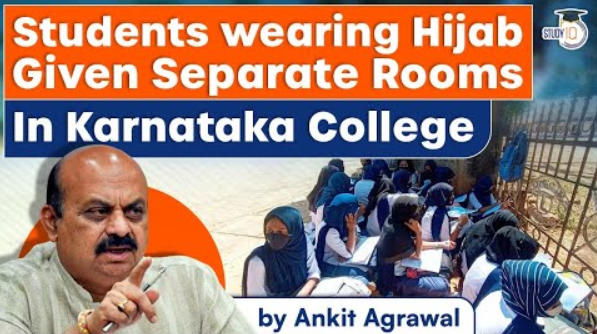Table of Contents
How it all started?
- In December, Udipi’s Kundapur PU college’s principal – Rudra Gowda issued a circular – banning students from wearing hijabs in classrooms.
- Defending his order, Gowda said, “Students are free to wear hijabs inside school premises but not in classrooms. This rule is being followed to ensure uniformity in classrooms“.
- This decision led to uproar, with some students not being allowed to enter classrooms by college staff and fellow students.


- Around 25 Muslim students were denied entry into the premises of a college in Karnataka on the grounds that they were wearing a hijab.
- Earlier, a government college in Udupi district had barred students from wearing hijab to classes.
- The issue later spilled over to other colleges as well.
- The incident involving the 25 students took place at the Kundapur government pre-university college in Udupi district where Hindu students on Wednesday came to college wearing saffron towels objecting to Muslim students wearing hijab.
In a separate classroom
- Relenting to Hijab protests across Karnataka, the Government PU College, Kundapura allowed the Hijab-clad female students to enter the premises on Monday.
- However, in a controversial move, the Hijab-clad students have been seated in separate classrooms, away from other students.

- An order issued by the Karnataka government’s Department for Pre-University Education on February 5 has not made uniforms compulsory in pre-university colleges,
- But has attempted to argue that banning headscarves or hijabs for students attending classes is not a violation of the right to practise their religion.
What’s the new order?
- It states that students in all government pre-university colleges must follow the rules for uniforms set by the local college development council and that in colleges where no uniform is prescribed efforts must be made to ensure unity.
- The order also says that all government schools have to abide by the uniform policy prescribed by the state and that private schools can have uniforms as decided by their councils.
- At present, uniforms are mandated in state-run schools but are optional in PU colleges.
- It states that school and college councils have the responsibility of maintaining equality on their campuses while imparting education.
- “However, it has been noticed by the education department that in some educational institutions students are following the customs of their respective religions and this is affecting the equality and uniformity in the institutions.”
Constitutional provisions
- Article 25(1) of the Constitution guarantees the “freedom of conscience and the right freely to profess, practise and propagate religion”.
- It is a right that guarantees a negative liberty — which means that the state shall ensure that there is no interference or obstacle to exercise this freedom.
- However, like all fundamental rights, the state can restrict the right for grounds of public order, decency, morality, health and other state interests.
- Over the years, the Supreme Court has evolved a practical test of sorts to determine what religious practices can be constitutionally protected and what can be ignored.
- In 1954, the Supreme Court held in the Shirur Mutt case that the term “religion” will cover all rituals and practices “integral” to a religion.
Then what about wearing hijab?
- The order quotes judgments of the Supreme Court and various High Courts to argue that banning hijabs in schools and colleges is not a violation of the fundamental right to practise religion as prescribed by Article 25 of the Constitution.
- These include a Kerala High Court judgment on December 4, 2018, in which it quoted a Supreme Court observation in Asha Renjan and others vs State of Bihar (2017) to state that “individual interest must yield to larger public interest”.
Q) Which among the following fundamental rights are available to non-citizens?
- Freedom of speech
- Protection against self incrimation
- Freedom of conscience
- Non-discrimination in matters of employment
- 1, 2 & 3 only
- 1, 3 & 4 only
- 2 & 3 only
- 2 only
























 WhatsApp
WhatsApp